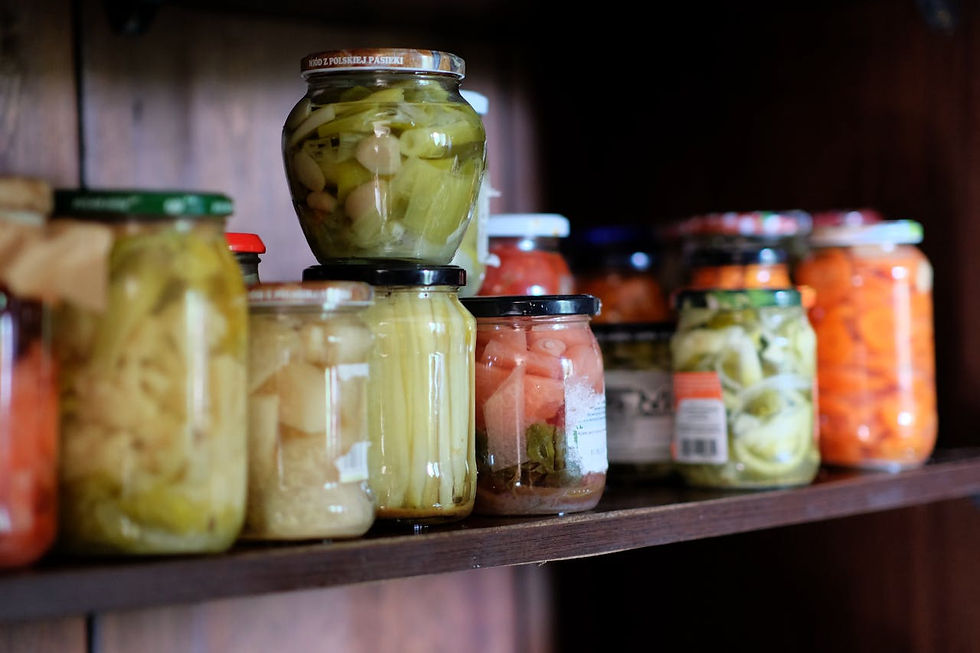Breaking the Mold: The Revolutionary Power of Food Preservation
- Food Magazine Official
- Nov 22, 2023
- 3 min read

Introduction:
In a world that constantly evolves, one fundamental aspect remains unchanged—the importance of food preservation. From ancient civilizations to the modern era, the ability to store and preserve food has been pivotal in sustaining societies. Today, as we navigate the complexities of global food systems, the revolutionary power of food preservation takes center stage, offering solutions to food security challenges and fostering sustainability.
Historical Perspective:
The history of food preservation dates back to the earliest human civilizations. Recognizing the perishable nature of food, our ancestors developed innovative techniques to extend its shelf life. Methods such as drying, salting, and fermenting were employed to preserve fruits, vegetables, and meats. These practices not only ensured survival during periods of scarcity but also laid the foundation for diverse culinary traditions.
The Importance of Food Preservation:
The importance of food preservation cannot be overstated. It serves as a critical link between agricultural abundance and the nutritional needs of a growing population. By preventing spoilage and waste, food preservation plays a vital role in addressing global food security challenges. In a world where millions still suffer from hunger, efficient preservation methods become an ethical imperative.
Reducing Food Waste:
Food waste is a pressing issue worldwide. According to the Food and Agriculture Organization (FAO) of the United Nations, about one-third of all food produced for human consumption is lost or wasted annually. Food preservation techniques act as a powerful tool in reducing this staggering waste by extending the usable life of perishable items.
Mitigating Seasonal Fluctuations:
Agriculture is inherently seasonal, with periods of abundance followed by scarcity. The ability to preserve surplus harvests enables communities to bridge the gap between seasons. Whether through canning, freezing, or dehydrating, preserving excess produce during times of plenty ensures a more consistent food supply throughout the year.
Enhancing Food Security:
Food security is a complex issue influenced by factors such as climate change, population growth, and economic disparities. Food preservation contributes to enhanced food security by creating a buffer against sudden disruptions in the food supply chain. Communities armed with effective preservation methods are better equipped to weather crises and uncertainties.
Promoting Sustainability:
The environmental impact of food production is a growing concern. By reducing the need for constant cultivation and transportation, food preservation aids in lowering the carbon footprint of the food industry. Sustainable practices, such as canning local produce or fermenting vegetables, contribute to eco-friendly food systems.
Modern Techniques:
While traditional methods remain relevant, the 21st century has witnessed the emergence of cutting-edge technologies in food preservation. Refrigeration, vacuum packaging, and modified atmosphere storage are just a few examples of how science has enhanced our ability to keep food fresh for longer periods. These innovations not only extend shelf life but also maintain the nutritional quality of stored items.
Cold Chain Logistics:
The global cold chain, a network of temperature-controlled storage and distribution, has revolutionized the preservation and transportation of perishable goods. This intricate system ensures that fresh produce can be transported across continents, expanding market access for farmers and providing consumers with a diverse array of food options year-round.
Emerging Technologies:
Advancements in food preservation technologies, such as high-pressure processing and pulsed electric field treatment, are paving the way for more efficient and sustainable methods. These techniques kill or inactivate microorganisms, ensuring food safety while minimizing the need for chemical preservatives.
Conclusion:
Breaking the mold of conventional thinking, the revolutionary power of food preservation continues to shape the way we approach global food challenges. From ancient practices rooted in necessity to modern innovations driven by science, the importance of food preservation transcends time and culture. As we navigate an era marked by environmental concerns and a growing population, the ability to store and preserve food stands as a beacon of hope, offering sustainable solutions to nourish and sustain the world.
Read more : - Beyond the Box: Unconventional Food Packaging Ideas


Comments